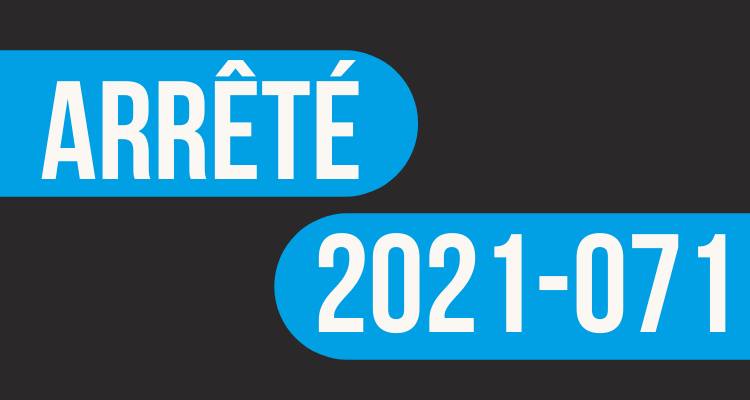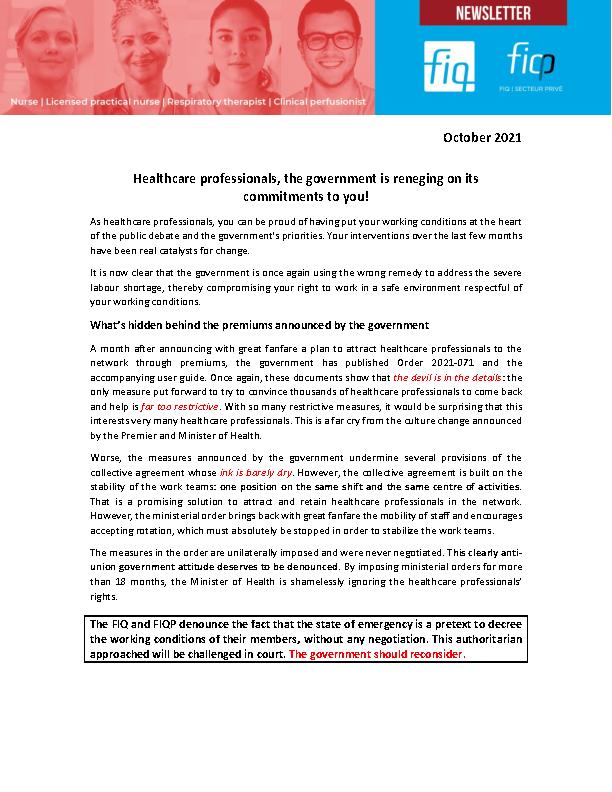
Overly restrictive premiums: the government reneges on its own commitments
One month after announcing an ambitious plan, the Fédération interprofessionnelle de la santé–FIQ finds that the Minister of Health is betraying the hopes of healthcare professionals because the only measure he has put forth to try to convince thousands of them to come back and lend a hand is too restrictive to create real enthusiasm. He even went so far as to renege on his own commitments to greater team stability, a principle that is at the heart of the new collective agreement.

Newsletter no 1 – Healthcare professionals, the government is reneging on its commitments to you!
The FIQ will not let this insult slide and will evaluate contesting this ministerial order by all possible channels.
“There is a shortage of thousands of healthcare professionals in the field. There are breakdowns in service, emergencies and delivery rooms are closed. There is no more time to wait. The order is too restrictive and destroys the chances of attracting and retaining healthcare professionals. We are currently depriving ourselves of a workforce that could take some of the pressure off the network. The government needs to take a step back, With the complexity of the order and all the criteria that could disqualify those who want to return to the network, how can the government claim to be achieving its objective? The Minister of Health has an obligation of result, it is his responsibility to see that it happens.”
Nathalie Levesque, Interim President, Fédération interprofessionnelle de la Santé du Québec–FIQ.
The FIQ members’ and population’s expectations are currently very high while the health network has been under stress for months. The ink is barely dry on the new collective agreement when the government is unfortunately looking to deviate from it. Incentives were intended to be a bridge before the new collective agreement could have its full effect in the field in stabilizing work teams and curbing workforce mobility. Instead, the provisions of the order thwart efforts by opening the door to more rotation positions and staff mobility.
“The Minister of Health refuses to listen to the healthcare professionals. He is forgetting why they left and what conditions might bring them back: the end of MOT and a better work-family balance. We are a long way from the change in culture announced by the Premier and Minister of Health. We ask our members to be cautious before committing themselves and to be well informed of the conditions”, stated Nathalie Levesque.
What ministerial order 2021-071 implies:
- Suspension of the provincial and local provisions of the collective agreements, such as the rules on temporary assignments to apply the measures in the order, creating an inequity.
- Employees with full-time evening positions not allowed to have the 9/14 schedule, while it was meant to be an asset to stabilize the teams on this more difficult shift to fill.
- The self-scheduling project is compromised, a key measure for work-family balance, because priority is given to healthcare professionals who have accepted the conditions of the order.
- The order brings back mobility, encourages healthcare professionals to accept shift rotation, while we had agreed with the President of the Conseil du trésor on the objective of bringing stability to the work teams.
- It will be difficult to reach the 80% proportion of full-time positions, a prerequisite for the annual target of care hours per bed in CHSLDs/EPCs. Therefore, the first effort towards ratios has literally fallen by the wayside.
- A leave without pay or unpaid absence could result in loss of eligibility and a claim for refund.
- A parental leave ending after December 15 makes the employee ineligible for the lump sums.
- Unjustified tardiness could negate eligibility for lump sums.
